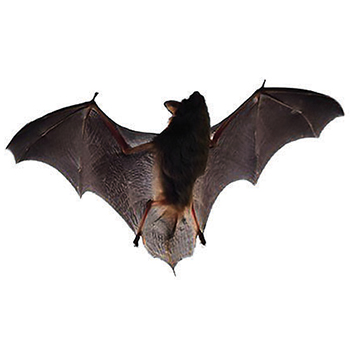New Jersey Bat Control Services

Bats are flying mammals found in almost every region of the world, and they’re generally considered to be highly beneficial to their environments. However, when bats are found nesting in your New Jersey business or home, it’s difficult to think of them as beneficial.
To protect your New Jersey home or business from bats, you need to learn about the behavior of this pest, take steps for prevention, and find effective treatment options should an infestation occur.
Problems With Bats in New Jersey Homes and Businesses
As beneficial as they may be to the environment, bats can also be a major detriment to your home or business. While bats are generally quiet and impact buildings only minimally, exposure to bats should be avoided as much as possible. Bats can carry disease, most significantly rabies. While rabies is rare in humans, (only 1–3 human cases are diagnosed in the United States each year,) almost 50% of cases in humans are linked to bat exposure.
4–7% of wild bats caught and tested in New Jersey are carriers of rabies. It’s important to note that wildlife experts believe the general rate of infection in bats is significantly lower than this. However, infected animals are more likely to be easily caught and tested than their healthier counterparts. There are only two cases on record in New Jersey’s history of humans being fatally exposed to rabies by bats–once in 1971 and once in 1997. While rabies is entirely treatable, it must be addressed before signs appear. Anyone who could have been exposed to a bite by a bat or other wildlife should be immediately tested and treated for rabies.
Understanding The Habits of New Jersey Bat Species
Nine species of bats can be found in New Jersey. Six of these species live in the state year-round, while three of them are migratory and spend the winter months in warmer climes. The New Jersey wildlife control experts at Viking Pest state year-round bat species include:
- Indiana bat (endangered)
- Eastern small-footed bat
- Little brown bat
- Northern long-eared bat
- Eastern pipistrelle
- Big brown bat
Although they don’t migrate, these species are dormant in the winter, and they can be found in hibernation in caves, mines, and rock crevices. This allows them to conserve energy when food is scarce.
New Jersey’s migratory species are:
- Hoary bat
- Red bat
- Silver-haired bat
New Jersey Bat Conservation Guidelines and Regulations
New Jersey’s Endangered and Nongame Species Conservation Act went into effect in 1973. This act protects non-game wildlife like bats from harassment, capture, or death by human hands. It’s illegal to poison or trap bats to remove them from your home or business. Flytraps, glue traps, and other methods of capture such as physical restraint are all forbidden under New Jersey law. That’s why it’s important to call in the professional wildlife control experts at Viking Pest to help control bats in New Jersey
The proper way to remove bats from your New Jersey home or business is to utilize exclusion practices to prevent them from entering your property. If a bat (or colony) has already taken up residence in your home or business, you can prevent them from re-entering after they leave to hunt each night. Even then, there are specific guidelines around seasonality to protect the natural life cycles of New Jersey’s bat population. The New Jersey wildlife control experts at Viking Pest explain in New Jersey, legal dates for exclusion are April 1-30 and August 1-October 15. Exclusions are expressly forbidden in May, June, and July. This is because exclusion can threaten nursery colonies. Roosting females leave at night to feed. If mothers are unable to return to their young, the pups soon starve.
You can learn more about the regulations for bat control in New Jersey here.
What to Do if There’s a Bat in Your New Jersey Home or Business
First, you must determine whether or not there’s any chance that a human has been bitten by the bat. Sometimes bat bites are hard to detect. Individuals can be bitten in their sleep and remain completely oblivious to that fact. If the bat had access to an adult who was sleeping or otherwise unconscious or unaware, or if there was a child in the room, the individual should be immediately tested for exposure to rabies.
If you’ve determined that there has been no human exposure to the bat, you should turn on all lights in the room and open up all doors and windows to encourage the bat to leave. Since bats can sense air currents moving around them, they’ll escape as soon as they’re able to do so.
If the bat is disabled or especially reluctant to leave, a wildlife removal professional should be called. As mentioned above, there are very specific rules surrounding bat removal and control in New Jersey, and it should be handled professionally to prevent harm to yourself and the local wildlife population.
Bat Exclusion During Maternity Season
Bat exclusion can legally be performed April 1 – 30 and August 1 – October 15 as stated by the NJ Division of Fish and Wildlife. These guidelines protect bats and people by ensuring exclusion is done effectively, working with the bats’ natural rhythms. Performing exclusion work outside of these windows is more likely to result in bats getting into your living space and/or cause illegal harm to the animals. If bats are invading your home outside of the legal exclusion window, please read below.
- Our wildlife control experts can block openings between the bats’ roost and human living areas (i.e. the space beneath the attic door, holes in ceilings or walls, etc.) at any time of year since doing so will not disturb or trap bats. This is a preventative measure to keep bats from coming into contact with people or pets inside the home.
- For health-related concerns, residents should contact their local health department.
- You can find more info on the NJ Division of Fish and Wildlife Bat Conservation webpage and Bats in Buildings page.
As always, free bat houses are available to customers who’d like to give their bat colony a new place to roost – contact Viking Pest today if you would like to reserve a FREE bat house for your home.
Can Bats Spread COVID-19?
People cannot contract COVID-19/SARS-CoV-2 virus from bats.
Protecting Your New Jersey Home or Business With Viking Pest Control
Viking Pest offers expert treatment designed to effectively and efficiently control and prevent bats from invading your home or business in New Jersey. Our use of Integrated Pest Management (IPM) techniques focuses on finding the core of the pest concern and controlling bats from the source. Through IPM, pest control materials are selected and applied in a manner that minimizes risks to human health, pets, and the environment. Call Viking today for your FREE and NO OBLIGATION estimate at 1-800-618-2847 or schedule online today!














